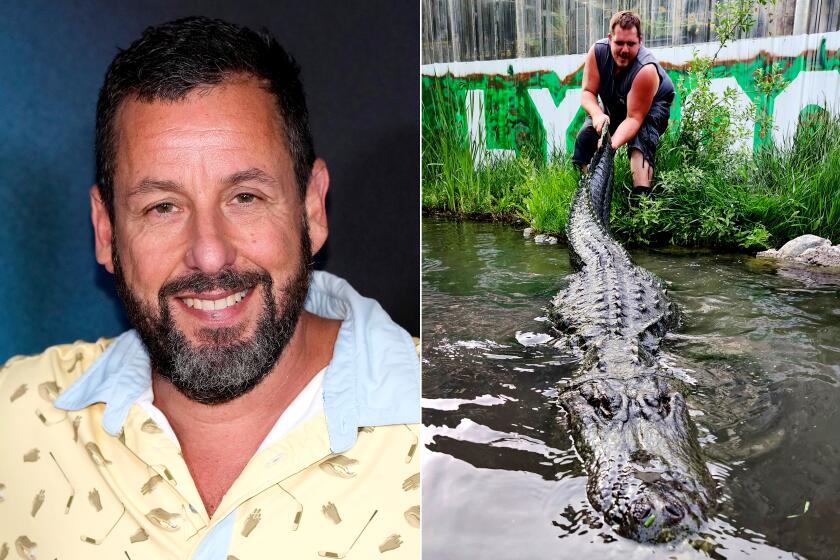THROWN FOR A LOOP : An Australian Filmmaker Discovers an Industrial-Strength Boomerang
- Share via
Gerri and I gabfest over lunch at a chic pasta hang. A letter from a mutual friend worries us. Like Gerri, she’s about to “chuck it all” and try her luck in the U.S.A. Gerri’s afraid she’s set a discouraging example. I try to dissuade her.
Spurred by best wishes from her daughter and friends, Gerri left Sydney, Australia, believing the cultural climate at home gave her little choice or chance. Like thousands of fortune-seekers before her, she took the heart-worn trail to Hollywood.
Gerri was one of a last wave of filmmakers generated by the Australian film industry boom of the ‘80s. It had taken her one day to raise the money for her acclaimed docudrama about Ned Kelly, a Robin Hood-like legend. But before she could establish her reputation, her career was stunted when the Australian government closed down the system of tax incentives that fueled Australia’s golden era of cinema. Deductions of 100% of expenses, plus 20% of profits, encouraged private corporate investment in film. But this scandal-ridden windfall for the rich, for whom quality and profits were optional, ultimately hurt small investors. There weren’t enough safeguards against rip-offs. When government funding ended, new talents like Gerri floundered.
According to Gerri, today’s Australian film industry is a closed shop where only “the favorites and one or two darlings” make movies. After a frustrating two-year money chase, she put everything she couldn’t hock in storage and jumped from the fire Down Under into the palm-handled frying pan. When I ask what advice she’d offer others like our friend, she says: “There’s no point coming here if you don’t have a list of contacts.”
When she talks about her project, a politically incorrect feminist comedy, her eyes widen excitedly, hands sweeping close-cropped red-brown hair. The years and stress lines vanish. But when I ask what’s shakin’ on the hustle front, the stress lines return. She’s been repeatedly told her project reminds “them” of a British film that’s currently a commercial splash. The strongest vetos come from women execs afraid that her project “will turn off the male audience.” About now, she’s jittery with every Northridge quake aftershock and battered by months of rebuffs, teetering between Prozac and the next plane home.
“There’s no logic to these rejections! If my script reminds them of a film that made 80 million but had a budget of 10 to 15 million--well, my film’ll only cost about three million!” Gerri moans. “Hollywood has no humor. There’s so much fear and no way to do straight business! ‘If we met you socially, then we could accept your script for our clients,’ ” was the verdict from four major agencies. Exasperated, Gerri’s approached the Canadians and the English. “The Brits are a lot cheekier. What’s most shocking here (in Hollywood)) is there’s NO RISK-TAKING ALLOWED! And they’re not talking about the script--but about box office . Creativity is not enough. You have to have a hard business edge. And how the ef do you live while following your dream ?”
Lightly, I ask her to believe in magic and make a wish. She closes her eyes and claps her hands. “Miramax will say, ‘Yes, here’s the money! Go make your movie.’ ” Should the impossible come true, Gerri still wants to go home. She enjoys the weather and tooling around in her snazzy little convertible, but . . .
“L.A. is like Calcutta! The cardboard houses smash you in the face.” Gerri’s haunted by the large numbers of homeless, a problem that is significantly smaller Down Under and doesn’t cause the “secret guilt” she finds among well-heeled Angelenos. Racism is also among Australia’s ills, but she’s staggered by L.A.’s version. “I’m allowed to ask questions because I’m white and a foreigner,” she says, but she’s frequently warned by other whites to “avoid ‘black areas’ and ‘greasy Mexicans.’ ” And she’s mystified by the “Alice-in-Wonderland stuff” she hears condemning violence while supporting gun control.
“L.A.’s the most intolerant cosmopolitan city I’ve ever been in . . . . Seems something’s going to explode any moment,” she says, half-awed, half-terrified. I remind her that L.A. did explode and still grapples with recovery. Then, as an afterthought, I press Gerri to say something different about my hometown. She lowers her chin cagily, raises her brows and twinkles her eyes.
“You give good salad.”
More to Read
Only good movies
Get the Indie Focus newsletter, Mark Olsen's weekly guide to the world of cinema.
You may occasionally receive promotional content from the Los Angeles Times.










